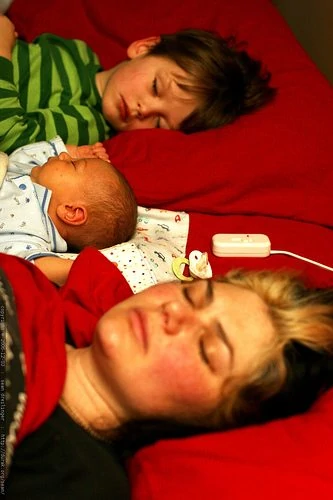Sleep serves important biological functions, giving the body time and opportunity for a host of metabolic processes that just can’t be done while we’re conscious and actively using our bodies and minds. It also serves important cognitive processes, such as solidifying memories and strengthening the brain for learning. Infants even learn while they sleep, as one study recently demonstrated. Interrupted sleep, in turn, may impair memory, if current animal studies prove to be correct.
We discuss the need for rest and quality sleep at some length in our book Yoga Calm for Children – a discussion summarized in our previous post, 10 Tips for Better Sleep.
Now we’re seeing that sleep may play a role in the epidemic of childhood obesity, as demonstrated in a study published earlier this year in Pediatrics. As ABC News’ coverage of the study noted,
The report…said young children who skimp on sleep both during the week and on the weekends have a four-fold risk of obesity compared with their more well-rested peers.
* * *
Total sleep time for obese children was more variable on weekends than on school days and they tended to get less catch-up sleep compared with normal and overweight youngsters. Those who got the least amount of sleep overall had a 4.2 times higher risk of tipping the scales in the obese range than other children. When the researchers drew blood samples from a third of the children at random, the heaviest children also had the unhealthiest blood profiles.
Even children who slumbered little during the week but managed to make up for a small portion of missed sleep on the weekends tripled their risk of obesity.
Why should this be? One theory is that irregular sleep so messes with the body’s internal clock, hormone regulation is thrown out of whack and metabolism is disrupted. This, in turn, may lead the body to slow it down and retain fat stores.
Of course, we all know that the ongoing problem of childhood obesity isn’t a single-cause problem. (Indeed, at least one new study has been launched that aims to examine the full range of contributing factors, from the cellular level to the cultural.) There are, of course, the most conspicuous culprits – diet and lack of physical activity – but there are others, including stress, which ensures elevated cortisol levels, which in turn prompt the storage of fat. And many of these may prove to be mutually reinforcing factors, making the problem that much more difficult to solve.
Yet – as our newsletter subscribers know from our latest mailing, “Obesity on the Run?” – as awareness grows, we’re starting to see more practical proposals for combating it, from Michelle Obama’s Let’s Move! initiative to new models of taxing junk foods and subsidizing healthy ones.
In our next posts, we’ll look at more ways of confronting the obesity epidemic, including tips and activities to help kids to get outside and active.
Image by Visions By Vicky, via Flickr






